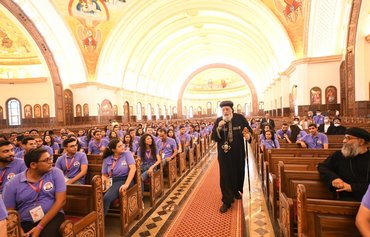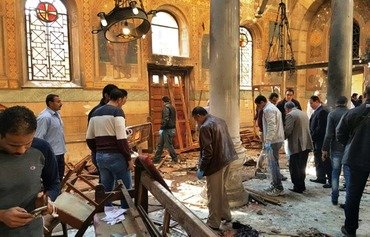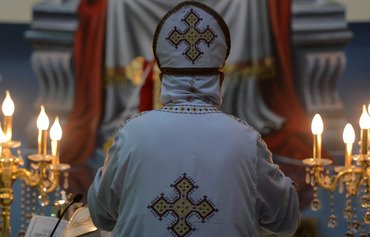Egyptian provinces have put strict security measures in place to secure churches against potential attacks during Coptic Christmas on January 7th, and to safeguard recreational sites that see a high turnout during the holiday period.
Plans to protect Egypt's churches over the holiday went into force in mid-December and will remain in effect until after the first week of the New Year, Brig. Gen. Mahmoud Salem of the Cairo Police told Al-Mashareq.
"The security plan encompassed 2,626 churches in Egypt belonging to the Orthodox, Catholic and Protestant denominations," he said.
Christmas prayers took place in the last week of 2016 for the Western denominations, while they are taking place the first week of the New Year for the Eastern denominations, he said, noting that the security plan covered all these churches, without exception.
Security measures begin at the perimeter of the church, with a checkpoint set up at least 200 metres away, he said.
The street in front of the church is blocked to traffic, he added, and uniformed and plainclothes security personnel are deployed around the building.
All churches are equipped with electronic security entrances to inspect entrants and their belongings, he said, and external and internal surveillance cameras have been installed.
Co-operation also has been established with the churches to facilitate the intervention of security personnel in case of emergency, or in the event a suspect object or person is detected, he added.
"More than 150,000 security personnel were assigned to the security of the churches, of whom 100,000 were deployed to back up the main forces assigned to those religious sites," Salem said.
These security measures and checks also apply to markets, malls, theatres, cinemas and amusement parks which become crowded during the holiday period, he added.
Church co-operation
"Those in charge of the churches and monasteries scattered across all Egyptian provinces are co-operating fully with the security agencies tasked with monitoring and protecting [religious sites] to prevent disastrous terrorist attacks such as the one that struck the St. Peter and St. Paul Church ," said the Rev. Sameh Iskandar of Mar Mina church in Giza.
Twenty-six people were killed in the December 11th attack on the Coptic church in Cairo's Abbasiya district which was claimed by the "Islamic State of Iraq and the Levant" (ISIL).
Scout teams at churches and monasteries were instructed to be on the lookout for any suspicious objects or individuals, Iskandar told Al-Mashareq.
"The security checks at the entrances are being carried out in collaboration with the security forces and involve monitoring entrants and reporting the entrance of any unknown individual," he said.
"Worshipers are typically known, especially during the holidays, as only parish members and their relatives enter the churches," Iskandar explained.
For their part, churches and monasteries will ensure worshipers leave the churches in smaller groups to prevent overcrowding in churchyards, he added.
"It was agreed with the Ministry of Interior that large numbers of female police officers also be deployed to search women at entrances to locations where religious ceremonies will be held," he added.
Joint operations room
Securing churches and monasteries in Egypt is not an easy task, said Maj. Gen. Yahya Mohammed Ali, a retired military officer and terror group expert.
It can only be achieved in co-operation between Muslims, Christians and the security forces charged with maintaining security, he told Al-Mashareq.
"It is easier to provide security to churches and monasteries located far from urban areas," he said. "In major cities in particular, the majority of churches are located in residential areas amid homes of people of all religions and sects, which makes the isolation and monitoring process rather difficult."
The task of securing churches and monasteries is not confined to the police, but includes the army and other security units, such as General Security, National Security and Central Security forces, he said.
Because the police are busy, the army has taken over the task of securing train stations and metro lines, he said, adding that security and Rapid Intervention Forces are deployed in large numbers in Egypt's main streets and squares.
"All these measures and officials tasked with implementing them are tied to a joint operations room located at the Ministry of Interior, which falls directly under the Office of the Minister of Interior," he added.
This will "expedite the decision making process related to any intervention necessary to contain any threat", Ali said.

![Security measures are being ramped up at Saint Virgin Mary's Coptic Orthodox Church in Cairo, also known as the Hanging Church, for Coptic Christmas on January 7th. [Waleed Abu al-Khair/Al-Mashareq]](/cnmi_am/images/2017/01/05/6961-Egypt-Cairo-church-600_384.jpg)






